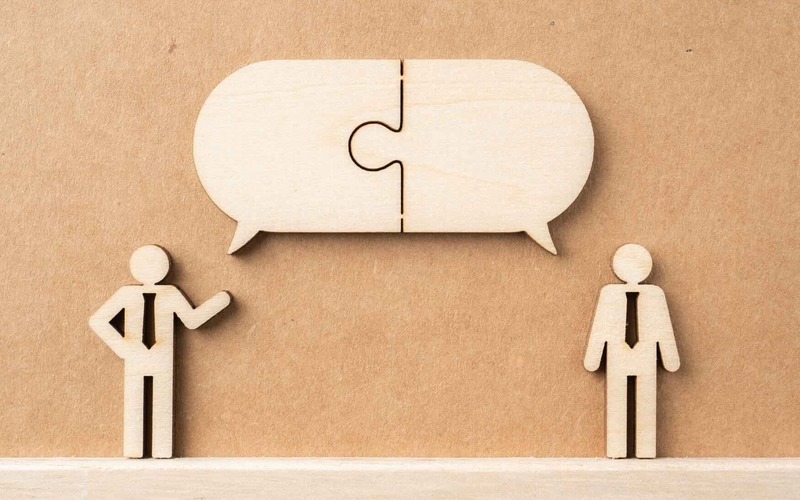How to keep your emotions under control

"Oh, the nerve! What is she thinking?" That annoying colleague has seriously irritated you, and you nearly boil with anger, to say the least. Or your heart is pounding with anxiety: "Oh dear, I hope I didn't say anything wrong in the meeting, my manager was rather short-tempered."
These kinds of emotions are obviously very inconvenient. And you would rather not let your (negative) emotions take over. And fortunately you don't have to, because you can control your emotions and your thoughts.
Emotions are useful
We often think of emotions as something you can't control, almost as a reflex. The truth is a little more nuanced. Emotions are actually very valuable. They help us survive. Literally.
Neuroscientists have discovered that our brain is constantly monitoring our "body's well-being." For example, is there a danger? Or are you too hot or too cold? Based on this info, your brain is going to predict the best action for you. To do this, your brain uses your previous experiences and your senses (what you see, hear, feel, smell or taste at that moment).
Therefore, in similar situations (for example, someone insulting you) you may react in completely different ways. Sometimes you get very angry, sometimes you stay quiet. This is because in addition to past experiences, the brain uses sensory input to predict which response will be best for that particular situation.
In doing so, your brain seeks the best balance and equilibrium for your "body's well-being." The brain compares the current situation with previously stored experiences and tries to make the best prediction for the most optimal response based on that. Unfortunately, these predictions are not flawless. Your sensory input either confirms the brain's predictions as correct, or the brain learns and changes incorrect predictions.
The power of emotions
When you wake up in the morning, how do you feel? Fresh and sprightly? Or rather sullen and moody? And at the end of the day? Exhausted? Or full of energy? The general feeling you experience throughout the day is not technically an emotion. But how pleasant or unpleasant you feel does have a big impact on the intensity of your emotions. The sun on your skin or a dormant headache, for example. But fatigue or how calm or excited you are also play a role.
So your body has an impact on your emotions. When your body is out of balance, your brain starts looking for an explanation. Your mood determines how you connect with those around you. How you communicate and react.
Why does this matter? Well, it can have far-reaching consequences. When your boss is having a bad day, it may not be appropriate to discuss a higher salary. Scientific research confirms this. In a job interview, for example, interviewees are rated more negatively on rainy days than on sunny days.
But emotions do more. For example, they also affect how much you spend. Are you stressed? For some people, that manifests itself in shopping. Or if you are happy, you can suddenly be much more generous to yourself and others....
Reasons enough to get a better grip on your emotions. Because then you are mentally a lot stronger. Imagine this: you are not immediately irritated when someone gives you feedback. Or you don't feel threatened/jealous when your colleague is promoted. And you don't immediately panic when things go wrong. Wouldn't that be a relief for you and those around you?
Get your emotions under control
To be clear: getting your emotions under control is not the same as suppressing or ignoring them. That does not work. Think of it as a ball that you push under water. You can keep that up for a while but sooner or later that ball will come back to the surface. And the harder you push it under, the more forcefully it jumps back up. The trick is to acknowledge your emotions and know that they don't have to take control of you.
Here's how to do it:
1. Take care of your body
Keep your body wellness in good shape because it has a huge impact on your emotions. How you feel is the basis of any emotional response. Adequate sleep is crucial. When you are physically and mentally rested, you can handle the world much better. A good night's sleep is essential for regulating emotions, improving your mood and reducing stress. Also make sure you get plenty of exercise. Exercise, walking in nature, physical activity brings balance and equilibrium, also for your emotional well-being.
2. Pay attention to your breathing
Your breathing also affects your emotions. When you are stressed or anxious, your breathing can become rapid and shallow. By consciously breathing and relaxing, your body and mind will begin to calm down. There are several breathing techniques that can help regulate emotions, such as meditation, yoga or the 4-7-8 breathing, in which you inhale for four seconds, hold your breath for seven seconds and exhale for eight seconds. By practicing these techniques regularly, you can train your body to respond better to stressful situations and manage your emotions more effectively.
3. Label your emotions
Communication is an essential part of dealing with emotions. By communicating openly and honestly about your emotions and needs, you can avoid misunderstandings and build relationships based on trust and understanding. Try to express your emotions in a respectful way and try to listen to the emotions of others. Sometimes just expressing your emotions can help you better understand and process them.
4. Rationalize your emotions
Be aware that right now (when tempers are heated) you are seeing the world through an emotional lens. And that the emotion you feel is a signal to change something. Breathe calmly, drink a glass of water, go for a walk, call a friend, change your environment and your perspective. No doubt your emotions will disappear like snow in the sun....
5. Surround yourself with positive energy
When you're feeling down, it's easy to seek out that negativity, which keeps you stuck in it. Try to spend time with positive people who encourage and support you. Avoid people who bring negativity and drama into your life.
Or also provide inspirational experiences, such as books, movies, podcasts and music that make you feel good and energized. This can help you be more optimistic and motivated. Focus on things you are grateful for. Expressing gratitude can help stimulate positive emotions and focus on what is going well in your life.
6. Take a time-out
There are no quick fixes when it comes to your emotions. They usually overwhelm you at a vulnerable time. Therefore, this last tip, which can certainly help when you are in danger of being swept away in a waterfall of emotions. Hit the pause button. If you notice your emotions getting the upper hand in a conversation, ask to step back for a moment. Take time to calm yourself (and the other person) and think about how best to move forward. This will give you more perspective and calm.
Learn more:
- Finding Your Emotional Balance: Course in emotional intelligence
- Dealing with feedback: Giving and receiving feedback
Interesting reading:
- Emotional Intelligence - Daniel Goleman
- How emotions are made - Lisa Feldman Barrett







